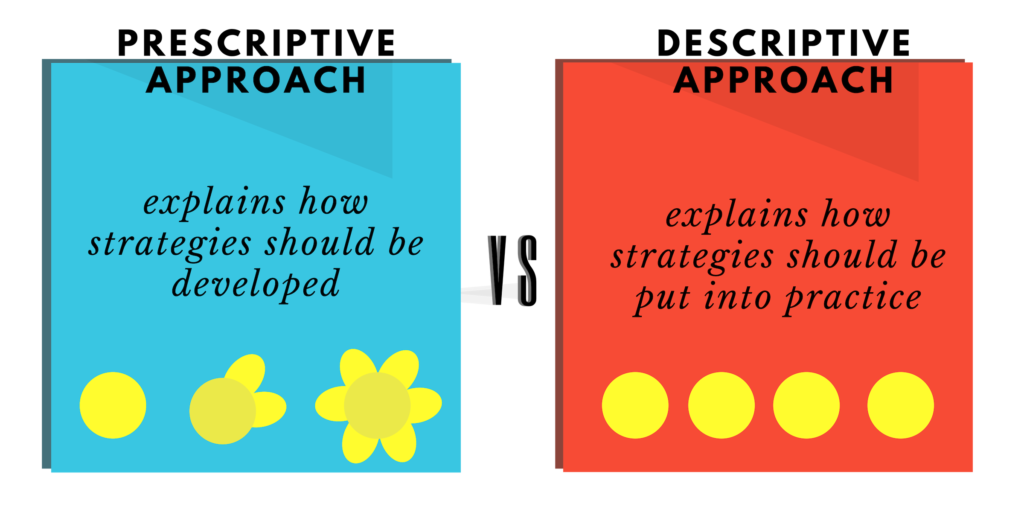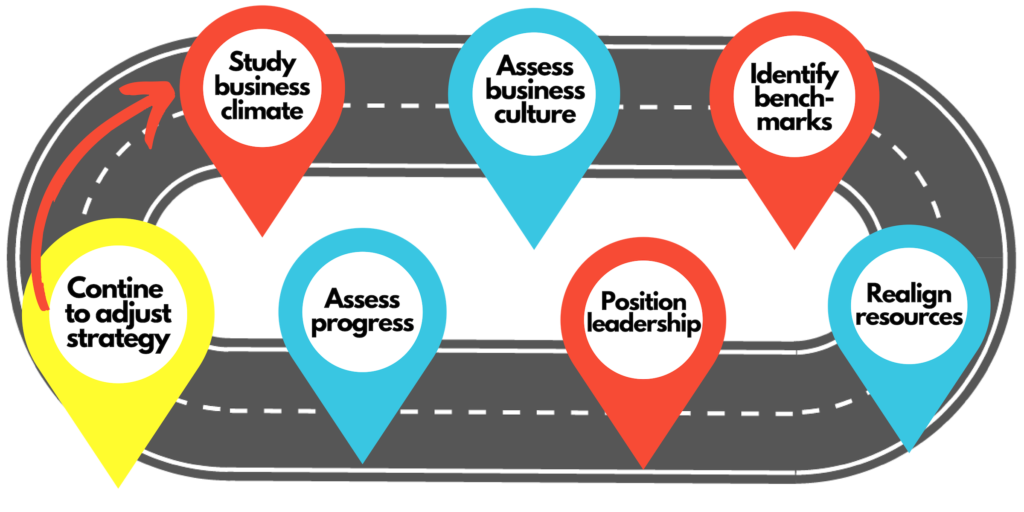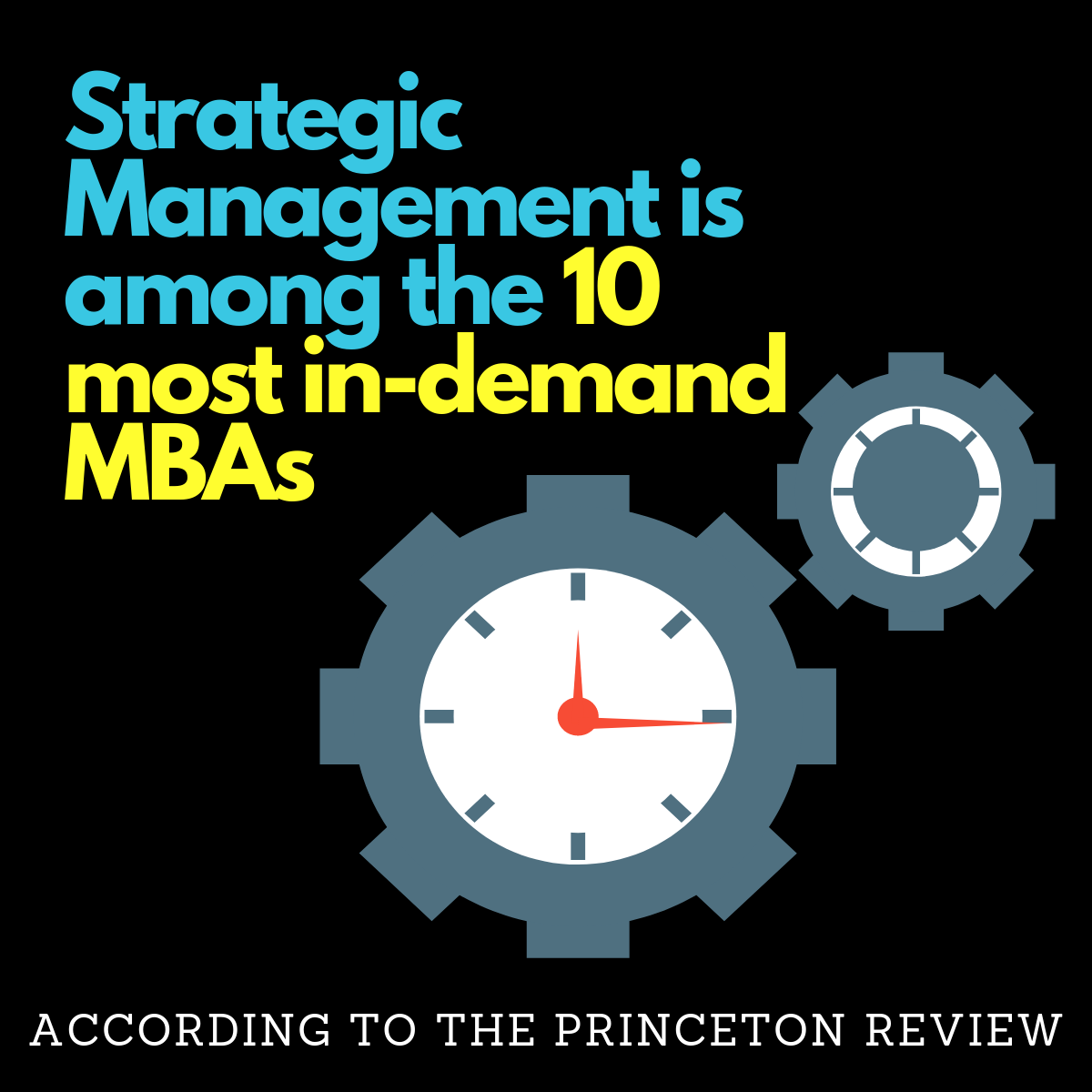![]()
“Strategy without tactics is the slowest route to victory. Tactics without strategy is the noise before defeat”– Sun Tzu
Do you approach business like a game of chess? Do you find yourself naturally sizing up the competition’s position, anticipating threats and opportunities for advancement, and thinking several moves ahead? Do you thrive on competition, enjoy crafting smart business tactics, and love using your insights to achieve a win for your company? If you have a knack for strategy and tactics in business, you’d be a great candidate for an MBA in strategic management.
Featured Schools
The world of business is complex, competitive, and constantly evolving. To succeed in this climate, companies need to detect and seize opportunities, avoid unnecessary risks, maximize profits, earn a strong reputation, and stay a step ahead of the competition. In other words, companies need to make smart and sound business decisions. To do that, they need professionals with skills in strategic management.
Strategic management, in a nutshell, means allocating an organization’s resources- from staff and capital to supplies and infrastructure- towards the achievement of its corporate goals. This requires a deep understanding of the competitive environment, market forces, corporate culture, and economic factors. It also requires a thorough mastery of risk assessment, decision making, change management, and the best way to capitalize on technology and innovation.
An MBA in strategic management provides the training that business executives needed to succeed in this essential business function. In earning an MBA in strategy, you’ll learn how to shape a business plan based on sound principles and solid information. You’ll develop solid decision-making skills and gain insights into market forces that affect corporate success. You’ll also gain a sought-after credential that’s associated with lucrative salaries, a wide range of employment options, high job demand, and a prestigious career path.
What is Strategic Management?
Strategic management is defined as the process by which an organization manages its resources in order to meet its goals through planning, oversight, monitoring, and analysis. To accomplish this, strategic managers assess a business’ current state, create strategies to improve market share, roll out changes, assess their performance, and fine-tune plans based on results. Sound business decision-making is at the heart of strategic management, and analyzing and weighing cross-functional business decisions is a major part of the practice.

As Forbes describes it, strategic management is less a set of processes and more of a way of thinking. This mindset requires strategic leaders to pull back from their day to day work of management, business oversight, and resolving issues in order to see and address the “big picture.” This discipline exists at the intersection of the marketing world and the world of management. To succeed in strategic management, you’ll need to understand the market forces at play and have the skills necessary to develop and deploy plans based on that insight.
How Does Strategic Management Work?
There’s no one established path to success in the world of business, with some companies favoring risk-taking and rapid growth, and others focused on sustainable growth and reputation building. It should be no surprise that there are quite a few schools of thought in the world of strategic management. . These different frameworks and theories of management theories guide the decisions made by organizational leaders. New variations are continually developed as the business world changes, thanks to forces like globalization and new technology. But a few common models that have stood the test of time include:
- Porter’s Five Forces which provides multiple perspectives for understanding the competitive environment
- Elton Mayo’s Human Relations Theory which proposes to improve human productivity through stronger relationships with employees
- Total Quality Management (TQM) which governs quality control in the manufacturing process

Broadly speaking, there are two main approaches to strategic management: a prescriptive approach and a descriptive approach. A prescriptive approach is an an analytic process that involves risk and opportunity assessment, and explains how strategies should be developed. A descriptive approach provides guiding principles and describes the way that strategies should be put into practice.
The ideas that guide an organization’s strategic management can come from many sources, such as:
- Past experiences with previous strategies
- Strategic management theory and principles
- Information from the actual business environment
The person or people responsible for developing an organization’s strategic management can also vary from company to company. These include:
- The CEO or other top leadership position
- Lower-level employees with ground-level experience
- A group of dedicated strategic management professionals
What do Strategic Managers Do?

Strategic management involves careful and systematic research, planning, and analysis. Although this can take different forms, and varies by industry, the practice of strategic management generally follows the same path from start to finish.
- Research the business environment, including the marketplace and economic factors affecting the organization
- Understand organizational culture, including employee attitudes and behaviors, as well as organizational structure and employee skills and competencies
- Identify benchmarks, both internal and external, such as production, efficiency, and employee retention
- Realign resources to meet goals, including human resources, capital, and infrastructure
- Position leadership for oversight, allowing management to supervise the creation, sale, and deployment of services or products
- Assess progress towards targets by measuring and evaluating real performance against established benchmarks
- Continue to adjust strategy based on measured performance and employee feedback to improve real-world outcomes over time
What Makes a Good Strategic Manager?
A good strategic manager brings to the table a strategic way of thinking about business and practical expertise in developing and managing business plans. A successful strategic management professional has a tactical mindset and a varied skill set that encompasses the ability to make plans and take action. Key traits of a successful strategic manager include:
Analytical Thinking
Strategic managers must be able to analyze the key strengths and weaknesses of a company, to assess the marketplace and the competition, and to parse out problems that are limiting a business’ success. You’ll also need to be able to weigh business risks versus opportunities, and to weigh long and short term advantages of different approaches.
Vision
Having a big picture vision for an organization is crucial for success in strategic management. This means understanding a business’ mission and being able to envision specific goals that will align with that purpose.
Problem-Solving
Strategic managers need to come up with creative solutions to business problems, such as how to achieve a business goal with limited resources, respond to new regulations, or change an ineffective business culture. This may mean developing a creative solution or thinking outside the box.
Leadership
Strategic managers must be able to implement their strategic plans by leading others, from management to staff. They must have authority and communication skills in order to put their vision for the business into practice at all levels.
Flexibility
Strategic management is an ongoing process, and those who practice it must be able to respond to changes in regulations, economics, technology, market forces, and other business factors. They must also be able to evaluate their business plan after it has been deployed and continue to adapt it based on performance and feedback.

What is a Strategic Management MBA?
An MBA is the gold standard in business degrees, and prepares graduates for a range of high-paying managerial roles. This degree takes typically takes two years to earn for full time students, as we have covered, there are many excellent Accelerated MBA Programs which can take as little as 18 months. Part-time students may need three years or more to finish their coursework. The course of study for an MBA is specific to business, and covers the fundamentals of business in core classes, along with business electives. In many programs, students can tailor these electives to pursue a concentration in a specific area of business, such as human resources, marketing, or strategy.
Simply put, a strategic management MBA, or strategy MBA, is a regular MBA with a specialized concentration in strategy. As US News and World Report points out, an MBA in Strategic Management is fundamentally different than an MBA concentration in a specific area of business, such as finance or marketing. An MBA in Strategic Management is less technical and more broad, and addresses organization-wide performance, rather than management within a department.
In a strategic management MBA, students learn about how to assess internal and external operating environments, approaches to increase market share, and methods to weigh opportunities versus risks. Along the way, students can also expect to learn about sound business decision-making, develop leadership, master business communication, and gain insights about how to best position a company within a competitive environment.
Featured Schools
What Classes Will I Take for a Strategic Management MBA?
The curriculum for an MBA in strategy will vary by school, and many business schools teach similar classes under different course titles. In general, you can expect to take 1-2 required classes on the fundamentals of strategy, along with 2-3 electives in the area of strategic management. Typical classes in this discipline include:
- Managing Established Enterprises
- Managing Emerging Enterprises
- Intellectual Property Strategy
- Strategic Implementation
- Strategic Management of Technology
- Competitive Strategy
- Innovation, Change & Entrepreneurship
- Environmental Law
- Corporate Strategy
- Global Strategy
An MBA in strategic management will generally conclude with a capstone. This culminating experience may be project based or research based, and usually takes up 1-2 courses during a student’s final year.
Can I Earn a Strategic Management MBA Online?
It’s not only possible, but popular to earn this sought-after degree online. In fact, we’ve recently researched and ranked the Best Online MBAs in Strategic Management. These degree programs usually follow the same curriculum as a traditional MBA program, and in many cases the actual diploma delivered by schools with both on-campus and online divisions will be identical.
Online MBA programs like those we’ve ranked are more flexible than traditional on-campus MBA programs, as they are designed to fit the schedules of working professionals. A typical online MBA program will feature asynchronous and synchronous course content, so students can interact with professors and peers for some class assignments and lessons, while also working independently at whatever time of day works best for them. Being able to save commuting time, study from any location, and work around an existing schedule makes an online MBA far more convenient for those already holding down management positions, and is a popular choice among mid-career professionals.
Many of the Best Online MBAs include an on-campus learning component, such as a single live orientation session, few weekend intensives or one week-long residency per year. These face-to-face learning opportunities are intended to develop peer-to-peer and student-to-professor relationships and provide the opportunity for online MBA students to forge the professional network that graduates come to rely on in their careers after graduation. Schools which don’t have this requirement usually offer virtual networking opportunities such as student forums, social networks, and online consortiums.
How Much Can I Earn with a Strategic Management MBA?
The person responsible for building a company’s market strategy holds a lot of responsibility. That’s why this position requires a high level of expertise, such as an MBA in strategic management, and why it is associated with a lucrative salary. According to Payscale reports that a general MBA is associated with an average salary of $85,000. An article in Poets and Quants notes that, “MBA students who have specialized in strategy make more than their peers.” In fact, the article found that this particular concentration was more lucrative than any other specialization, earning some $13,900 more than any other field. Factor in the many benefits and bonuses that come with a high-level career at a larger company, and this high salary looks like an even better prospect.

What Jobs Can I Get with a Strategic Management MBA?
Every business has a mission statement, and every organization must work hard to keep their practices and performance in line with it. That means those with an MBA in Strategy can find employment across all sectors of the business world.
Top employers for those with an MBA in strategy, according to Payscale, include powerful corporations such as:
- International Business Machines (IBM) Corp.
- Deloitte Consulting LLP
- Amazon.com Inc
- Microsoft Corp
- Intel Corporation
- PricewaterhouseCoopers
- AT&T Inc.
While businesses of all sizes employ strategic managers, large companies such as those mentioned above pay generous salaries and benefits, and offer plenty of room for professional advancement, making them attractive places to work. These large corporations are mostly headquartered in major cities, and so top locations for strategic management professionals include New York City, Chicago, San Francisco, Atlanta, and Seattle.

The job titles found in the field of strategy can vary. What doesn’t differ is the fact that these are leadership positions, associated with high responsibility and high salaries. Some common job titles and salaries for those with an MBA in Strategic Management include:
- Senior Strategy Manager: $136,420 average salary
- Management Consultant: $119,506 average salary
- Senior Product Manager: $127,756 average salary
- Management Consultant: $119,506 average salary
- Finance Manager: $106,477 average salary
Senior positions are, of course, associated with higher salaries. With 10-19 years’ experience, you can earn $132,129 on average. With 20 years experience or more, you can make an average of $171,301, according to Payscale.
Featured Programs
What is the Job Market with a Strategic Management MBA?
An MBA is the gold standard in business education, and remains an in-demand degree.
Poets and Quants reports that 78% of 350 large employers surveyed planned to hire new MBA graduates in 2019, keeping pace with figures from previous years.

MBAs in general have broad marketplace applications, with companies in every industry relying on MBAs as managers and executives. An MBA in strategy has an even broader marketplace value than a general MBA, since this degree is not confined to a single industry or department. All companies need effective managers who can help their businesses stay competitive and gain a larger market share by developing and implementing strategic plans. This holds true regardless of business size, industry, history, or culture. By teaching universal business principles like consulting, business development, risk management, and planning, an MBA in strategy gives graduates access to a broad market.
According to the Princeton Review, an MBA in strategy is among the 10 most in-demand MBA specialization. That’s not a passing trend, either, but a reflection this credential’s value in the corporate world across a wide range of industries, where sound decision making and strategic insight will always be at a premium.
What are the Pros and Cons of a Strategic Management MBA?
A strategic management MBA has a number of excellent selling points, but there’s no denying that this is not the right academic and career path for everyone. Before diving in, you’ll want to explore the pros and cons, and weigh your priorities.
Pros of a Strategic Management MBA
Versatile This degree teaches decision-making, analysis, and entrepreneurial thinking, all of which have broad applications across a range of industries. This translates to high job demand and flexible career options.
Lucrative An MBA in strategy is associated with an average salary of $117,000. This impressive number is even higher for those employed at major corporations and mid-career professionals.
Prestigious Careers As the person driving a business’ strategy, you’ll hold a lot of responsibility. That includes high-level positions with a great degree of authority and prestige, and even the potential for a c-suite position.
Cons of a Strategic Management MBA
Less Technical Although the versatility of an MBA in strategic management can be appealing, many people prefer to develop focused expertise in a specific department, such as finance, or even a more niche area such as healthcare management.
Demanding This degree and career path are challenging, requiring professionals to make difficult decisions in complex and ambiguous situations, and to take responsibility for the outcomes. This can be a stressful position as well, as strategic managers may have to work with stiff marketplace competition, limited resources, tight budgets, and entrenched business cultures.
Requires leadership While few people pursue an MBA who are not interested in managing others, it takes a certain type to want to spearhead an organization’s strategy. For those who would rather work more closely with smaller teams, an MBA in strategic management may not be the best fit.
In short, this degree and career are well-suited to analytical thinkers with a knack for making big plans and the persistence to see them through. To succeed in this field, you’ll need to be someone who’s capable of seeing the big picture, solving complex problems, and making tricky decisions. If this describes you, an MBA in strategic management would be an excellent choice.